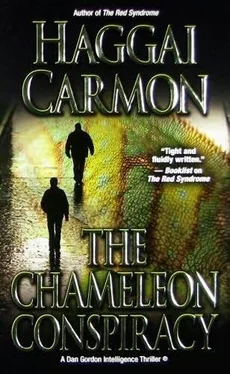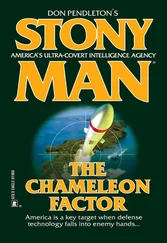Haggai Harmon - The Chameleon Conspiracy
Здесь есть возможность читать онлайн «Haggai Harmon - The Chameleon Conspiracy» весь текст электронной книги совершенно бесплатно (целиком полную версию без сокращений). В некоторых случаях можно слушать аудио, скачать через торрент в формате fb2 и присутствует краткое содержание. Жанр: Триллер, на английском языке. Описание произведения, (предисловие) а так же отзывы посетителей доступны на портале библиотеки ЛибКат.
- Название:The Chameleon Conspiracy
- Автор:
- Жанр:
- Год:неизвестен
- ISBN:нет данных
- Рейтинг книги:5 / 5. Голосов: 1
-
Избранное:Добавить в избранное
- Отзывы:
-
Ваша оценка:
- 100
- 1
- 2
- 3
- 4
- 5
The Chameleon Conspiracy: краткое содержание, описание и аннотация
Предлагаем к чтению аннотацию, описание, краткое содержание или предисловие (зависит от того, что написал сам автор книги «The Chameleon Conspiracy»). Если вы не нашли необходимую информацию о книге — напишите в комментариях, мы постараемся отыскать её.
The Chameleon Conspiracy — читать онлайн бесплатно полную книгу (весь текст) целиком
Ниже представлен текст книги, разбитый по страницам. Система сохранения места последней прочитанной страницы, позволяет с удобством читать онлайн бесплатно книгу «The Chameleon Conspiracy», без необходимости каждый раз заново искать на чём Вы остановились. Поставьте закладку, и сможете в любой момент перейти на страницу, на которой закончили чтение.
Интервал:
Закладка:
“Handicap?”
“Yes, he was dyslexic, with serious learning disabilities. Until he graduated he had difficulty reading and writing. Now, compound that with his speech impairment, and you can understand why we really tried to help him.”
“But what speech problem do you mean?
“He had a serious stutter.”
My blood pressure went up. Stutter? None of the victims had mentioned that. In fact, most of them described a smooth-talking person. Although even a bad stutter can be cured, the hunter in me smelled blood.
“Thank you very much,” I said. “I’ve got one last question. Do you happen to have Ward’s picture?”
“You know, I must have it somewhere,” said Peterson. “Ward loved photography, and he took many photos of class events. I’m pretty sure he sent me copies of several shots he made at graduation.”
“If he was the photographer, doesn’t that mean he isn’t in those pictures?”
“No, I think he should be, actually, because he used a timer for the shutter, I guess. So he could run and be in the picture.”
“Mr. Peterson, could I ask you a favor? Could you please send me those photos? I promise to send them back.”
“Let me find them first.”
Four days later, an envelope came in the mail with three color pictures of smiling high school kids at a party. In the attached note, Donald Peterson identified most of the students by name, apologizing that he couldn’t remember them all. Ward looked like a nice kid, your neighbor’s son. No especially distinctive features, overgrown light-brown hair, brown eyes, nice smile. They were a lot livelier than his formal high school graduation photo in the file. I wrote down the names of classmates Peterson had identified, and asked Esther Quinn, our office admin clerk, to run a check on them with their current addresses. I wondered, grumbling to myself a little, why Esther and I were stuck doing the legwork the FBI had neglected.
I called Donna Swanson, the first name on the high school principal’s list, at her home in Los Angeles.
“Yes, I remember Albert, but I haven’t heard from or seen him since we graduated,” she said. “If you need current information, you should call his best friend, Tyrone Maloney. They must have stayed in contact. They were buddies.”
Later, Esther handed me an address and phone number. “Tyrone Maloney has a bicycle store in New York,” she said.
I decided to get some fresh air and see a face. I went to his store in SoHo, on the southern part of Manhattan. Maloney was a stocky fellow, with blond hair and a broad smile.
That smile disappeared when I told him who I was and asked him about Albert Ward.
“Bad news?” he asked. “Has he been found?”
I ducked the question. “What do you mean?”
“I mean, has he been found? The last time I heard from him was more than twenty years ago, and I haven’t seen or heard from him since.”
“When was that, the last time you heard from him?”
“Let me see,” he said, frowning a bit. “That must have been 1982 or 1983.”
“Can you tell me about it?”
“He left the United States at the end of 1980 after saving up some money. He wanted to travel the world, take photographs and sell them to travel magazines. He had no family left in the United States, so he figured he could do anything.”
“Do you know where he went?”
“Yeah, I do. He went on a freighter to Hong Kong working as a cook’s assistant. He liked jobs where he didn’t have to talk a lot. Because of his stutter, you know.”
“Did he stay in Hong Kong?”
“He did, but then he moved on. I received a few postcards from China, Thailand, and Pakistan.”
“Which one came last?”
“I think the one from Pakistan. I haven’t heard from him since.”
“Did you try to find him?”
“I called a few of our mutual friends, but none of them had heard anything. None of his postcards carried a return address, so I could never write back. He didn’t write much, just one or two lines saying he was having a great time, see you soon, stuff like that.”
“Do you still have those postcards?”
“I’m sorry, no, I never kept them. Tell me, is he OK?”
“I don’t know,” I said candidly. “Not yet, at least.”
It was getting dark. I decided that instead of returning to my office, I’d go home and walk Snap, my happy-go-lucky golden retriever. Though he had a tendency to overdo it with his licking and jumping on people with his long front legs that almost reached my shoulders, he was a loyal friend who always seemed able to put a smile on my face even when I was in a bad mood, which wasn’t all that infrequent. He sure as heck deserved more attention than a bunch of stale files, now resurrected.
CHAPTER FIVE
I had to decide on a direction for my investigation. Shooting in the dark has its advantages, because sometimes you hit targets you didn’t know were there. But on the other hand, the odds aren’t great, and you waste time when you find out what you hit is irrelevant. I knew that Ward, for lack of a better name to call him, was already long off the U.S. radar. He wasn’t going anywhere years after he’d vanished, if he hadn’t done that thus far. So time wasn’t of the essence-a reverse form of a phrase I had frequently used when I (briefly) practiced law and wanted to move lazy people into doing something. He couldn’t get more lost. I thought of Alex, my Mossad Academy training instructor, who used to say that urgent is the legitimate son of neglect. But now, I was practicing futility. I needed to get a more current physical description of my man-or men. I called the OTS, the Office of Thrift Supervision, a federal agency that regulates the federal and some state savings banks and savings-and-loan associations. I was hoping that its examiners might have included identification information in their reports.
“That South Dakota case is a really old one, inherited from the Federal Home Loan Bank Board, our predecessor regulatory agency,” said Brian DiLorenzo, an assistant general counsel. “The documents may be archived. Actually, they may even have been destroyed under our regular document retention schedule. Hold on.” I heard him click on his computer keyboard. “Well, it seems that $20 million is a lot for just one in what looks like a series of scams. I see here that we still have these files open.”
“Could I please have a copy of any investigation reports? I’m trying to figure out where the money is. Maybe we could recoup some of it.”
A few days later a big envelope containing four inch-thick folders came by Federal Express. DiLorenzo’s attached note said, “You’re in luck. Enclosed are pertinent documents of the scams perpetrated by your con men against four regulated institutions. Please call me if you need further assistance.”
I leafed through the files. They included the reports of four savings banks that had been had by a con man-or maybe con men?- and various regulatory steps that OTS’s predecessor agency had taken when it seized the four failed institutions. One document attracted my attention. It was a letter written by Harrington T. Whitney-Davis on letterhead of Fidelity Trustees of America, Inc., the name of the firm he had misleadingly and fraudulently used to perpetrate his scam on the South Dakota savings bank. In the letter, Whitney-Davis confirmed that he had received $560,000 from the savings bank to purchase limited-edition treasury securities as an investment for the bank. There was an impressive looking signature by “Harrington T. Whitney-Davis,” but there was also a handwritten note attached: “Tim, I’ll call you later on today concerning dinner. HTWD.”
So the manager of the defrauded savings bank was having dinner with fraud artist “Whitney-Davis.” Maybe it meant nothing, but when you’re a manager of a savings bank, meeting for dinner the person who later took off with $20 million belonging to the bank and its customers might not be that innocent.
Читать дальшеИнтервал:
Закладка:
Похожие книги на «The Chameleon Conspiracy»
Представляем Вашему вниманию похожие книги на «The Chameleon Conspiracy» списком для выбора. Мы отобрали схожую по названию и смыслу литературу в надежде предоставить читателям больше вариантов отыскать новые, интересные, ещё непрочитанные произведения.
Обсуждение, отзывы о книге «The Chameleon Conspiracy» и просто собственные мнения читателей. Оставьте ваши комментарии, напишите, что Вы думаете о произведении, его смысле или главных героях. Укажите что конкретно понравилось, а что нет, и почему Вы так считаете.












